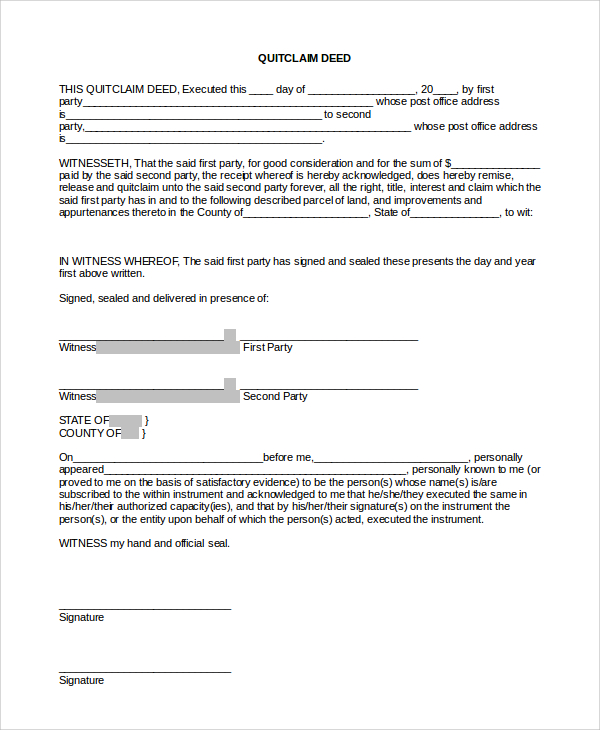

In fact, while online service providers prepare all kinds of deeds for customers, at least one such site states in a product footnote that it does not prepare quitclaim deeds in two states, one of them being Texas, and that it prepares warranty deeds for Texas customers instead.Ī quitclaim deed in Texas isn't as useful as it is in other states. Texas is one of the few states where insurance companies and attorneys freely admit they don't like using quitclaim deeds. Because of the lack of warranties, many attorneys will recommend that, if you're the buyer, you should avoid this type of deed. Thus, a buyer can't sue a seller who used a deed without warranty for any defect in title that appears later on. It conveys title to the buyer, but there's no warranty against any defects in the title. While the deed without warranty sells and conveys the property to the buyer, it's only slightly better than a quitclaim deed. Plus, a deed without warranty doesn't protect a buyer, because it provides no warranties that the title is good. Texas deeds without warrantyĪ Texas deed without warranty isn't used often, except in situations where a quitclaim deed might otherwise be used, because people avoid using quitclaim deeds in Texas. While sellers would likely prefer to use special warranty deeds if they could, buyers are better off using a general warranty deed. It's clear, then, that buyers are more protected by general warranty deeds than by special warranty deeds. Still, under a special warranty deed, the seller is not guaranteeing or warranting that someone else hasn't done something to create a defective title in the time before the seller owned the property. The seller, with a special warranty deed, is guaranteeing they haven't done anything to cause a problem with the title during the time they've owned the property, such as adding liens or easements to the property.

The seller only warrants the title is good from the time they acquired the property to the present time.
QUIT CLAIM DEED LOOPHOLES FREE
With a special warranty deed, the seller doesn't warrant the title is free and clear of defects from the beginning of time to the present. Texas special warranty deedsĪ special warranty deed doesn't provide as much protection as a general warranty deed, but it's still used in certain situations. Warranty deeds give more protection to the buyer than any other type of deed.
QUIT CLAIM DEED LOOPHOLES FULL
The seller guarantees or warrants that they have full title to the property and that they're allowed to transfer it to the buyer. A general warranty deed also assures the buyer that there will be no issues with the title. This type of deed guarantees the title comes without any liens, easements, or other title problems. The most common type of deed used in Texas is a general warranty deed. There are others, but these are the most common. There are four major types of deeds in Texas. Texas still discourages its residents from using quitclaim deeds, even for these transactions.

Many states allow quitclaim deeds between close relatives and spouses, because relatives and spouses generally know whether the title is good or not, and because these are relationships where there is a fair amount of trust. Some attorneys refer to quitclaim deeds as hardly a deed, or useless, and say there are better ways to convey, or transfer, property. Many Texas attorneys will tell their clients not to use quitclaim deeds, and most Texas title insurance companies don't like them if a prior owner used one at some point in time. In fact, while quitclaim deeds are valid, they're not often used in Texas because they're barely considered deeds at all. While all of these deeds are valid in Texas, this doesn't mean real estate attorneys favor them. There are several types of deeds people use to transfer property in Texas.


 0 kommentar(er)
0 kommentar(er)
